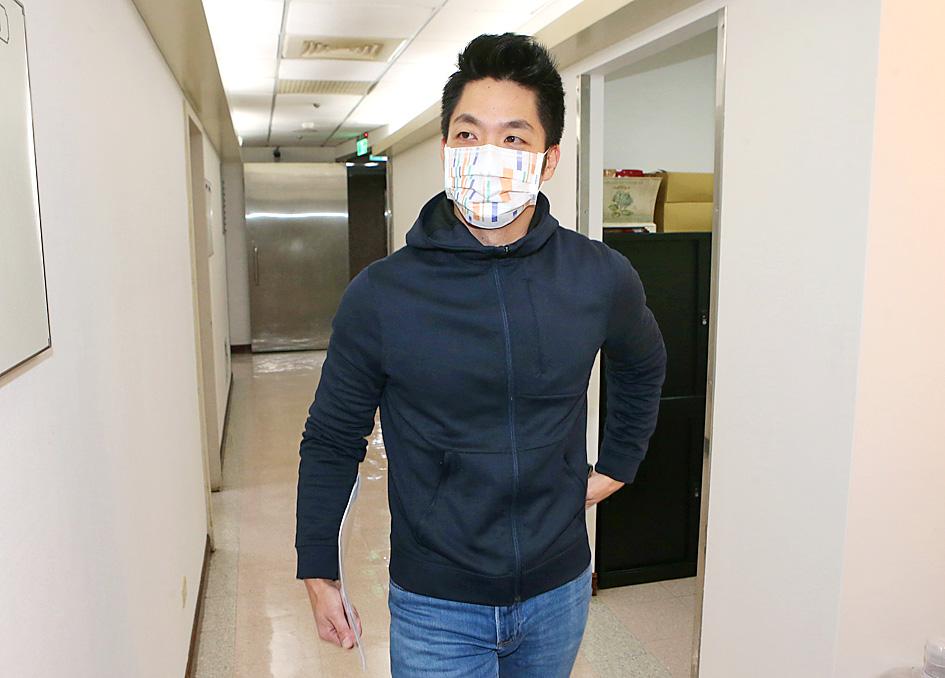Chinese Nationalist Party (KMT) Legislator Chiang Wan-an (蔣萬安) yesterday said that his proposal to amend the Act Governing the Recovery of Damage of Individual Rights During the Period of Martial Law (戒嚴時期人民受損權利回復條例) aims to expand the legal basis for victims of the White Terror era and Martial Law period to claim compensation from the state.
Many of the cases were not limited to the Criminal Code and should the amendment be passed, people prosecuted for contravening of the now-defunct punishment of rebellion act and the espionage laws of the period of the communist rebellion would also be eligible to file for state compensation, Chiang said.
People who has received a presidential reinstatement of integrity certificate, or those whose guilty verdict was overturned through the Act on Promoting Transitional Justice (促進轉型正義條例) would also be eligible, Chiang said.

Photo: CNA
According to the draft, if the person has passed away, their descendants or legally designated inheritor in Taiwan may also ask for their assets to be returned, he said.
If the assets are unable to be returned, or cannot be returned in their original state, the claimant may request that the government pay an appropriate sum instead, he said.
If the draft is passed, the official name of the act would be changed to the restoration of individual rights under the autocratic rule period act, Chiang said.
Chiang said he has always supported openly discussing the events of the White Terror era and Martial Law period, and that he expressed such sentiments when Formosan Political Prisoners’ Association honorary director-general Tsai Kuan-yu (蔡寬裕) visited the KMT’s Legislative Yuan caucus in 2017.
When the Legislative Yuan passed the Act on Promoting Transitional Justice on Dec. 5, 2017, Chiang said that he supported Article 6, which was proposed by the Democratic Progressive Party to redress judicial wrongs.
The article is aimed at facing history and restoring the truth, which is the first step Taiwanese must take to putting their past behind them, he said.
Chiang denied accusations that he was making the proposal to gain support for his bid to run as the party’s candidate for Taipei mayor next year.
Many of the victims are old and he wishes to expedite government compensation efforts, he said.
The great-grandson of former president Chiang Kai-shek (蔣介石), Chiang Wan-an said that he had not spoken with his father, former KMT vice chairman John Chiang (蔣孝嚴), about the amendment.

Chinese Nationalist Party (KMT) Chairman Eric Chu (朱立倫), spokeswoman Yang Chih-yu (楊智伃) and Legislator Hsieh Lung-chieh (謝龍介) would be summoned by police for questioning for leading an illegal assembly on Thursday evening last week, Minister of the Interior Liu Shyh-fang (劉世芳) said today. The three KMT officials led an assembly outside the Taipei City Prosecutors’ Office, a restricted area where public assembly is not allowed, protesting the questioning of several KMT staff and searches of KMT headquarters and offices in a recall petition forgery case. Chu, Yang and Hsieh are all suspected of contravening the Assembly and Parade Act (集會遊行法) by holding

PRAISE: Japanese visitor Takashi Kubota said the Taiwanese temple architecture images showcased in the AI Art Gallery were the most impressive displays he saw Taiwan does not have an official pavilion at the World Expo in Osaka, Japan, because of its diplomatic predicament, but the government-backed Tech World pavilion is drawing interest with its unique recreations of works by Taiwanese artists. The pavilion features an artificial intelligence (AI)-based art gallery showcasing works of famous Taiwanese artists from the Japanese colonial period using innovative technologies. Among its main simulated displays are Eastern gouache paintings by Chen Chin (陳進), Lin Yu-shan (林玉山) and Kuo Hsueh-hu (郭雪湖), who were the three young Taiwanese painters selected for the East Asian Painting exhibition in 1927. Gouache is a water-based

Taiwan would welcome the return of Honduras as a diplomatic ally if its next president decides to make such a move, Minister of Foreign Affairs Lin Chia-lung (林佳龍) said yesterday. “Of course, we would welcome Honduras if they want to restore diplomatic ties with Taiwan after their elections,” Lin said at a meeting of the legislature’s Foreign Affairs and National Defense Committee, when asked to comment on statements made by two of the three Honduran presidential candidates during the presidential campaign in the Central American country. Taiwan is paying close attention to the region as a whole in the wake of a

OFF-TARGET: More than 30,000 participants were expected to take part in the Games next month, but only 6,550 foreign and 19,400 Taiwanese athletes have registered Taipei city councilors yesterday blasted the organizers of next month’s World Masters Games over sudden timetable and venue changes, which they said have caused thousands of participants to back out of the international sporting event, among other organizational issues. They also cited visa delays and political interference by China as reasons many foreign athletes are requesting refunds for the event, to be held from May 17 to 30. Jointly organized by the Taipei and New Taipei City governments, the games have been rocked by numerous controversies since preparations began in 2020. Taipei City Councilor Lin Yen-feng (林延鳳) said yesterday that new measures by